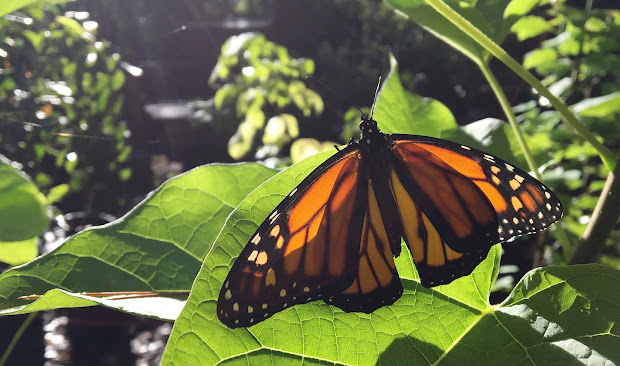Education Is Key to Stemming Water Pollution From Fertilizer Use
On July 15th, the Environmental Protection Commission of Hillsborough County declined to pass a summer fertilizer ban, as a number of other counties and municipalities have done. They did approve new regulations that prohibit the use of nitrogen-containing fertilizer prior to heavy rainfall and disallow use of fertilizer within 10 feet of a body of water, but this is small comfort to environmental advocates worried about surface water quality.
The EPCHC's compromise measures won't do much to curb excessive nutrients flowing into Tampa Bay and polluting our area lakes and rivers, but it could be argued that a more stringent ban wouldn't have done much either. Not because there isn't a whole lot more fertilizer than necessary being used on Hillsborough County landscapes (mostly lawns), but because even if passed the new regulation would likely have received little or no enforcement.
In January, neighboring Pinellas County passed such a ban and its environmental management staff are now working to get the word out to residents, but budget cuts have left them shorthanded. This summer, fertilizer can still be sold in stores, but it cannot applied until October 1st. Who's checking? Nobody. In 2011, retailers will not be allowed to sell nitrogen-containing fertilizer at all from June through September, except for agricultural use. Who will check up on them? Probably nobody. Next year's county budget is expected to be just as miserly as this year's, so it's hard to imagine county staff, already stretched thin, making an effort to track down retail fertilizer scofflaws. This is not to say that we shouldn't continue to advocate for fertilizer restrictions, just that we shouldn't assume that their passage will guarantee a change in people's behavior.
As Florida Native Plant Society members, we can't help much with enforcement of fertilizer laws, but we can do a lot to educate our neighbors and fellow gardeners about the problem of nutrient pollution in Florida surface waters and to encourage them to stop contributing to the problem. Once they understand the environmental and economic implications of polluted waterways, most people will act responsibly. As individuals, we must educate ourselves about topics like nonpoint-source pollution, the Clean Water Act, slow-release fertilizers, nutrients (nitrogen and phosphorus), algae blooms, and Florida climate cycles so that we can pass this knowledge on to others, one on one. As chapters, we should work with local governments to create and distribute brochures at our events, invite environmental managers to speak to our members, support passage of environmentally-friendly landscape and fertilizer ordinances, and keep promoting the use of Florida native plants in low-maintenance, fertilizer-free landscapes. Education is cheaper than ignorance, especially when it comes to cleaning up water pollution.
Learn More:
The EPCHC's compromise measures won't do much to curb excessive nutrients flowing into Tampa Bay and polluting our area lakes and rivers, but it could be argued that a more stringent ban wouldn't have done much either. Not because there isn't a whole lot more fertilizer than necessary being used on Hillsborough County landscapes (mostly lawns), but because even if passed the new regulation would likely have received little or no enforcement.
In January, neighboring Pinellas County passed such a ban and its environmental management staff are now working to get the word out to residents, but budget cuts have left them shorthanded. This summer, fertilizer can still be sold in stores, but it cannot applied until October 1st. Who's checking? Nobody. In 2011, retailers will not be allowed to sell nitrogen-containing fertilizer at all from June through September, except for agricultural use. Who will check up on them? Probably nobody. Next year's county budget is expected to be just as miserly as this year's, so it's hard to imagine county staff, already stretched thin, making an effort to track down retail fertilizer scofflaws. This is not to say that we shouldn't continue to advocate for fertilizer restrictions, just that we shouldn't assume that their passage will guarantee a change in people's behavior.
As Florida Native Plant Society members, we can't help much with enforcement of fertilizer laws, but we can do a lot to educate our neighbors and fellow gardeners about the problem of nutrient pollution in Florida surface waters and to encourage them to stop contributing to the problem. Once they understand the environmental and economic implications of polluted waterways, most people will act responsibly. As individuals, we must educate ourselves about topics like nonpoint-source pollution, the Clean Water Act, slow-release fertilizers, nutrients (nitrogen and phosphorus), algae blooms, and Florida climate cycles so that we can pass this knowledge on to others, one on one. As chapters, we should work with local governments to create and distribute brochures at our events, invite environmental managers to speak to our members, support passage of environmentally-friendly landscape and fertilizer ordinances, and keep promoting the use of Florida native plants in low-maintenance, fertilizer-free landscapes. Education is cheaper than ignorance, especially when it comes to cleaning up water pollution.
Learn More:
- Hold the Nitrogen and Phosphorus in the Summer
- Fertilizer Facts from the Southwest Florida Water Management District
- Model Fertilizer Ordinance from the Tampa Bay Estuary Program
- List of Florida Water Impaired by Nutrient Pollution
- A Green Blanket on the Water: Algae (How Too Many Nutrients Stress a Water Body)




Comments